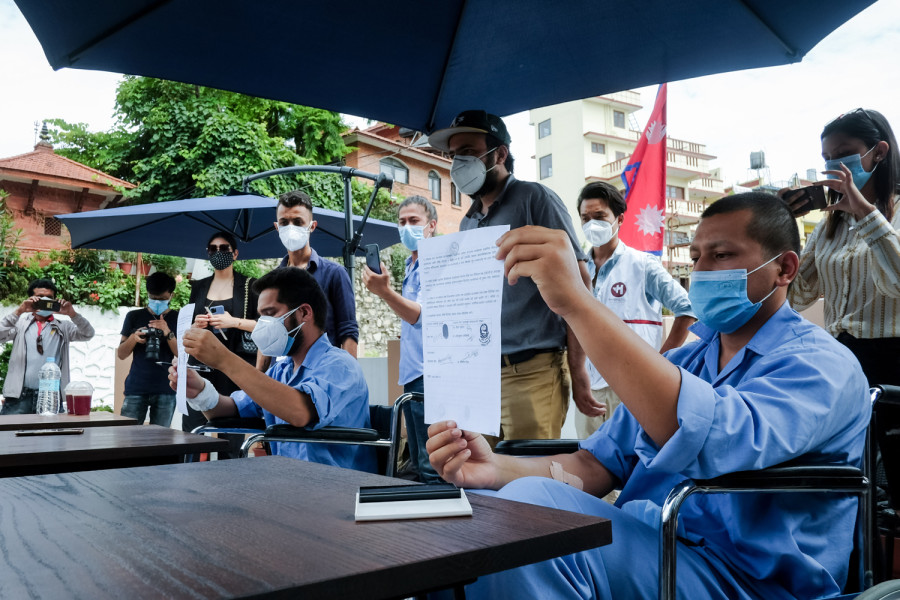National
Satyagraha campaign signs 12-point agreement with Health Ministry, calls off hunger strike
The satyagraha, called by the Enough is Enough campaign, had asked for better quarantine conditions, more PCR testing and financial transparency over Covid-19 spending.
Aditi Aryal
On Tuesday morning, the youth-led campaign Enough is Enough called off their hunger strike following a 12-point agreement with the health ministry on Monday evening. The campaign, that began with protests on June 9, has been ongoing in its quest to place pressure on the government to derive a better management strategy for the Covid-19 pandemic.
The first round of negotiations with the Health Ministry on Thursday had proved inconclusive, leading two protesters, Iih and Pukar Bam, to continue their hunger strike from HAMS Hospital, where they were brought on the same day owing to their deteriorating health.
More attempts to come to an amicable conclusion were made last week with several rounds of meetings on Friday but the exercise proved futile.
“We do not want to succumb to the government’s pressure until we get what we have been demanding all along,” Nayantara Gurung Kakshapati, one of the organisers of the campaign, had told the Post last week.
However, until Monday, there were no further meetings between the parties. A member of the campaign told the Post that despite their efforts to communicate with the government, there was no response, despite Prime Minister KP Sharma Oli visiting the protesters on Thursday at the hospital and promising to address their demands.
“During his visit to the hospital, the prime minister asked the protesters to break their hunger strike and promised to ensure that the demands of the campaign would be met,” a campaign member told the Post on condition of anonymity. “However, despite instructing the Home Ministry to look into our demands, we were continually ignored.”
On Monday evening, the ministry and the protesters were finally able to come to an agreement. The government has agreed to the demands of the campaign, such as placing people entering the country from abroad in mandatory quarantine for five days and allowing them to self quarantine only after testing. The guidelines for self quarantines will be finalised within a week, according to the agreement.
The government has agreed to discontinue the use of rapid diagnostic tests and increase polymerase chain reaction testing to detect the presence of the coronavirus on symptomatic as well as asymptomatic carriers, including healthcare workers and essential workers, migrant returnees, and contacts of people who have tested positive for Covid-19, while also ensuring the protection of dignity and prevention of violence against them. The government has also agreed to make public its spending on the pandemic.
However, members of the campaign remain sceptical about the agreement being implemented.
“Despite the government signing many agreement documents with Dr. Govinda KC to end his hunger strike, they were not implemented,” Bam, a protester, told the Post over the phone from HAMS Hospital. “We do not trust the government fully.”
His statement was echoed by Iih, who thinks the government listened to their demands a bit too late.
“Had this agreement been done a month earlier, it would have brought substantial difference. Now things are worsening and it will be difficult to implement this agreement,” he told the Post.
The campaigners have called off the hunger strike for now, but the campaign is still ongoing to ensure effective implementation of the agreement, said protesters. Iih has warned of another hunger strike if demands are not met in a week.




 16.12°C Kathmandu
16.12°C Kathmandu














